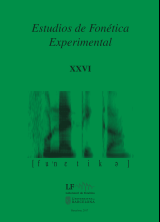Acoustic analysis of tonicity of relative words in indefinite free relative constructions
Keywords:
Stress, Relative words, Indefinite free relatives, TonicityAbstract
Relatives in indefinite free relatives (No tiene con quien hablar ‘He doesn’t have anybody to talk to’) are sometimes considered stressed and sometimes as unstressed. Our aim is to analize the nature of the accent in this kind of relative words in order to determine, by measuring the acoustic correlates of stress (intensity, duration and frequency), if these relative words are stressed or unstressed. We have carried out an acoustic and statistical analysis of the data with Praat and SPSS programs. Our results shows, in the first place, that interrogatives and relatives are not so different in tonicity, as the only parameter which allows to differenciate between them is duration, and just in the case of who and when. In the second place, the intensity values of the relatives that appear in indefinite free relatives are similar to the values stressed controls (interrogatives), specially the pronoun que, but this kind of data is very complex and shows a lot of variation.
References
BARTRA, A. (1990): «Sobre unes frases relatives sense antecedent», Caplletra, 8, pp. 131-148.
BOERSMA, P. y D. WEENINK (2014): Praat: Doing Phonetics by Computer (Versión 5.3.82). http://www.praat.org/ [26/07/2014]
BRUCART, J. M. (1992): «Some asymmetries in the functioning of relative pronouns in Spanish», Catalan Working Papers in Linguistics, 2, pp. 113-143.
BRUCART, J. M. (1999): «La estructura del sintagma nominal: las oraciones de relativo», en I. Bosque y V. Demonte (dirs.): Gramática Descriptiva de la Lengua Española, Madrid, Espasa-Calpe, vol. I, pp. 395-522.
CAPONIGRO, I. (2001): «On the semantics of indefinite free relatives», en M. van Koppen, J. Sio, M. de Vos (eds.): Proceedings of the 10th Meeting of the Student Organization of Linguistics in Europe, Leiden, pp. 49-62.
ESTEBAS VILAPLANA, E. y P. PRIETO (2010): «Castilian Spanish Intonation», en P. Prieto y P. Roseano (eds.): Transcription of Intonation of the Spanish Language, Munich, Lincom, pp. 17-48.
GARRIDO, J. M., C. LLISTERRI, C. DE LA MOTA y A. RÍOS (1993): «Prosodic differences in reading style: isolated vs. contextualized sentences», en Eurospeech 1993. Proceedings of the 3rd European conference on speech communication and technology, Berlin, pp. 573-576.
GROSU, A. y F. LANDMAN (1998): «Strange relatives of the third kind», Natural Language Semantics, 6, pp. 125-170.
GUTIÉRREZ, E. y P. PÉREZ OCÓN (2016) «Rasgos gramaticales de adverbios y pronombres relativos en construcciones existenciales», en M. V. Pavón (ed.): Las relaciones Interoracionales en Español, Berlin, Mouton de Gruyter, pp. 233-280.
HERNANZ, M. L. (1999): «El infinitivo», en I. Bosque y V. Demonte (dirs.): Gramática Descriptiva de la Lengua Española, Madrid, Espasa-Calpe, vol. 2, pp. 2197-2356.
HUALDE, J. I. y S. COLINA (2014): Los Sonidos del Español, Cambridge, Cambridge University Press.
LLISTERRI, J., R. MARÍN, C. MOTA, y A. RÍOS (1995): «Factors affecting F0 peak displacement in Spanish», en Proceedings of the 4th European Conference on Speech Communication and Technology, Madrid, 18-21 de septiembre de 1995, vol. 3, pp. 2061-2064.
LLISTERRI, J., M. J. MACHUCA, C. MOTA, M. RIERA y A. RÍOS (2005): «La percepción del acento léxico en español», en Filología y Lingüística. Estudios Ofrecidos a Antonio Quilis, Madrid, CSIC / UNED / Universidad de Valladolid, pp. 271-297.
LLISTERRI, J. (2007): «La caracterización del acento léxico en español: producción, percepción y métodos de estudio», conferencia en el Centro de Estudios Lingüísticos y Literarios, El Colegio de México, 10 de septiembre de 2007.
MARÍN, R. (1994). «La duración vocálica en español», Estudios de Lingüística de la Universidad de Alicante, 10, pp. 213-226.
MASULLO, P. J. (2011): «¿Lleva acento o no? Sobre un tipo de relativa libre poco estudiado», en V. Escandell, M. Leonetti y C. Sánchez (eds.), 60 Problemas de Gramática, Madrid, Akal, pp. 315-319.
NAVARRO TOMÁS, N. (1944): Manual de Entonación Española, Nueva York, Hispanic Institute.
OJEA, A. (1992): Los Sintagmas Relativos en Inglés y en Español, Oviedo, Publicaciones de la Universidad de Oviedo.
ORTEGA-LLEBARIA, M. y P. PRIETO (2010): «Acoustic correlates of stress in Central Catalan and Castilian Spanish», Language and Speech, 54, pp. 73-97.
PLANN, S. (1980): Relative Clauses in Spanish without Overt Antecedents and Related Constructions, Berkeley, University of California Press.
PRIETO, P., E. ESTEBAS VILAPLANA y M. M. VANRELL (2010): «The relevance of prosodic structure in tonal articulation: Edge effects at the prosodic word level in Catalan and Spanish», Journal of Phonetics, 38, pp. 688-707.
QUILIS, A. (1971): “Caracterización fonética del acento en español», Travaux de Linguistique et de Littérature, 9, pp. 53-72.
QUILIS, A. (1993): Tratado de Fonología y Fonética Españolas, Madrid, Gredos.
QUILIS, A. y M. ESQUEVA (1983): “Realización de los fonemas vocálicos españoles en posición fonética normal”, en M. Esgueva y M. Cantarero (eds.), Estudios de Fonética, Madrid, CSIC, vol. 1, pp. 159-252.
RAE-ASALE (2009): Nueva Gramática de la Lengua Española. Morfología y Sintaxis, Madrid, Espasa-Calpe.
RAE-ASALE (2010): Ortografía de la Lengua Española, Madrid, Espasa-Calpe.
RAE-ASALE (2011): Nueva Gramática de la lengua Española. Fonética y Fonología, Madrid, Espasa-Calpe.
SUÑER, M. (1984): «Free relatives and the matching parameter», The Linguistic Review, 3, pp. 363-387.
TÁBOAS, S. (1995): «Spanish infinitival relatives: a proposal about their indefiniteness requirement», Probus, 7, pp. 197-219.
Downloads
Published
How to Cite
Issue
Section
License

This work is licensed under a Creative Commons Attribution-NonCommercial-NoDerivatives 4.0 International License.
All articles published online by Estudios de Fonética Experimental are licensed under Creative Commons Attribution-NonCommercial-NoDerivs 4.0 International (CC BY-NC-ND 4.0 DEED), unless otherwise noted. Estudios de Fonética Experimental is an open access journal. Estudios de Fonética Experimental is hosted by RCUB (Revistes Científiques de la Universitat de Barcelona), powered by Open Journal Systems (OJS) software. The copyright is not transferred to the journal: authors hold the copyright and publishing rights without restrictions. The author is free to use and distribute pre and post-prints versions of his/her article. However, preprint versions are regarded as a work-in-progress version used as internal communication with the authors, and we prefer to share postprint versions.




